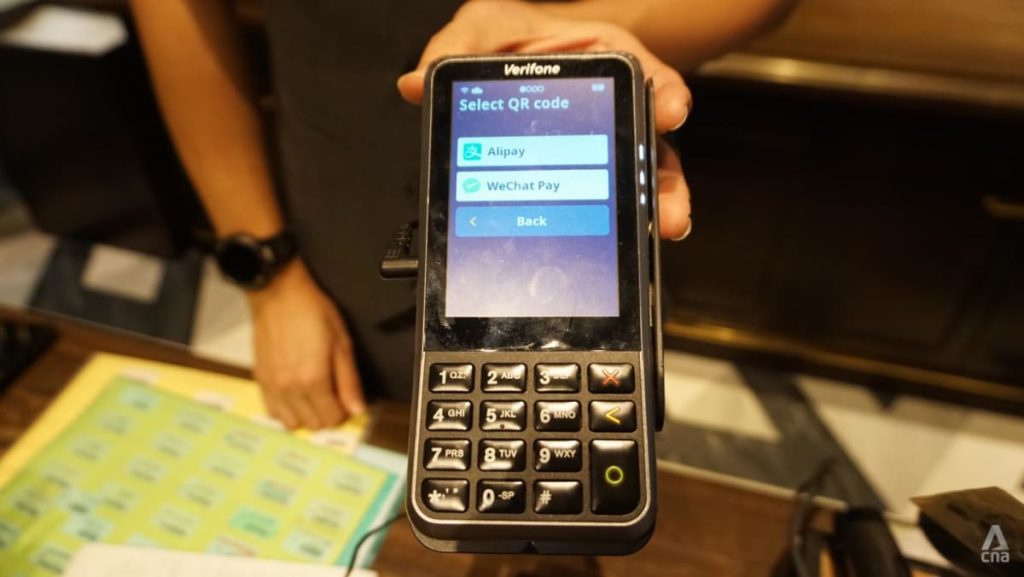The use of cashless payment methods, particularly WeChat Pay and Alipay, has been on the rise in Singapore, with more businesses and establishments accepting digital yuan. In May, a hotel started accepting cashless payments not only for suite stays but also in its bars, restaurants, spa, and gift shop. While official figures were not disclosed, the hotel confirmed an increase in the number of guests using Chinese e-payment methods. Another example is the local bike-sharing operator Anywheel, which saw over 4,500 new users from China within the first month of launching its new mini program in September. Over a span of six months, there were three times more users registered with +86 numbers, which is China’s country code.
The trend of accepting digital yuan has not been limited to big-name establishments but has also trickled down to smaller businesses like hawker stalls. According to official statistics from the Singapore Tourism Board, around 10,000 hawkers were accepting payment through WeChat. One hawker, Ms Rachel Chua, who runs a drink stall in the Maxwell Food Centre, shared that Chinese tourists would use Alipay even for small purchases like 30-cent tissue packets. To attract their attention, she prominently displays WeChat Pay and Alipay signs at the front of her stall. However, some Chinese tourists still prefer to use cash and coins for their smaller purchases. Ms Li Xiang from Guangxi, who visited Singapore during Golden Week with her boyfriend, mentioned that while they could use WeChat and Alipay in shopping malls, smaller places like hawker stalls did not accept them, prompting them to exchange cash as a precaution.
As more businesses in Singapore embrace cashless payment methods, Chinese tourists are finding it easier to navigate transactions while visiting the country. The convenience of using WeChat Pay and Alipay for a wide range of purchases, from hotel stays to small items at hawker stalls, has made the entire experience more seamless. The shift towards digital yuan aligns with the broader trend of technology advancing in the financial sector, providing users with more secure, efficient, and convenient payment options. By catering to the preferences of Chinese tourists who are familiar with these e-payment methods, businesses in Singapore are not only increasing their revenue but also enhancing the overall customer experience.
The adoption of digital yuan in Singapore extends beyond just businesses catering to Chinese tourists, as evidenced by the growing number of users registering with +86 numbers across various platforms. Anywheel’s success with attracting over 4,500 new users from China within the first month of launching its mini program highlights the potential for companies to tap into this market by accepting Chinese e-payment methods. The collaboration between Singaporean businesses and platforms that offer WeChat Pay and Alipay has created a mutually beneficial relationship that promotes tourism and drives economic growth. As more businesses follow suit and incorporate cashless payment options, Singapore is likely to become even more attractive to Chinese tourists looking for a seamless and familiar shopping and dining experience.
The shift towards cashless payments in Singapore, particularly through WeChat Pay and Alipay, is not only transforming the way transactions are conducted but also shaping the overall tourist experience for Chinese visitors. The convenience and efficiency of using digital yuan for various purchases, from hotel bookings to small items at hawker stalls, have made Singapore a more welcoming and user-friendly destination for Chinese tourists. By embracing this trend and providing options that cater to the preferences of international visitors, businesses in Singapore are not only staying competitive but also setting a new standard for seamless and secure transactions. With the continued integration of digital yuan into the local economy, Singapore is likely to see further growth in tourism and business opportunities, solidifying its position as a leading global financial and technology hub.













